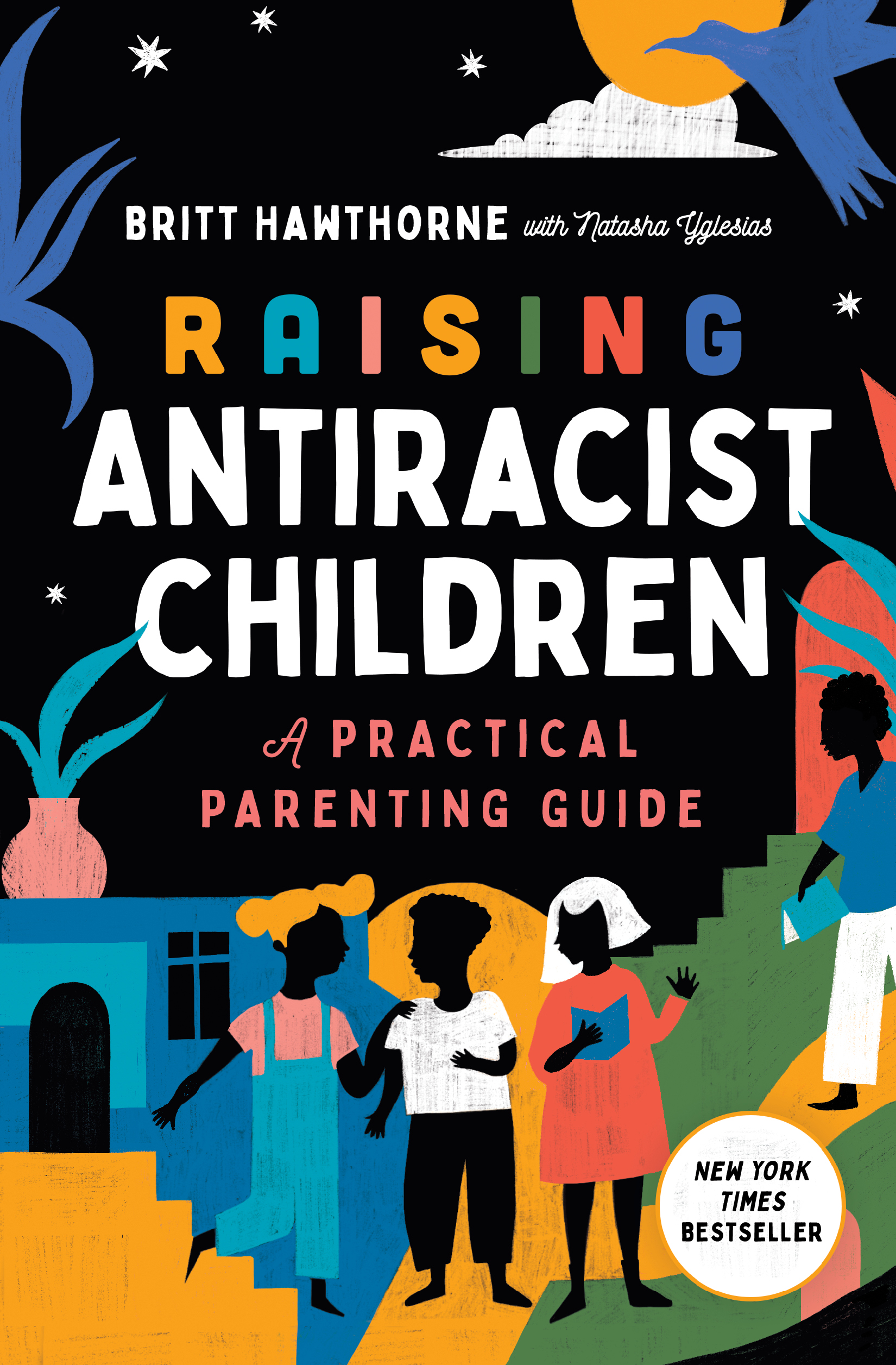When the need to have a critical conversation arises, it can be challenging to know where to start. A racial slur might have been thrown into a conversation at a family gathering, your partner and you disagree about a parenting practice, or your child may have picked up a stereotype from school. While having critical conversations with family, friends, and children can be difficult and uncomfortable, we must learn how to have them.
When Carter was three years old, he loved playing with my old cell phone that happened to have a hot-pink case. At the time, my partner was utterly opposed to it, concerned that playing with pink would “send the wrong message.” This small moment of fear was a learning opportunity for both of us. It offered us the chance to discuss gender, sexuality, and homophobia. But it was up to us to accept the opportunity or decline it. Critical conversations help us acknowledge how our misunderstandings will limit our children and us from becoming their whole selves.
What Is a Critical Conversation?
Critical conversations are as much for me, as they are for the other person. They allow us to live in harmony with our thoughts and actions while supporting the growth of our loved ones. With every critical conversation we engage in, we affirm our values of authenticity, accountability, becoming, and candor.
“The truth is a gift.”
We must be willing to work with our family, friends, and children, to create space for the truth and accountability. Otherwise, we’re being performative and people of the global majority are further harmed by this performance. We must create firm expectations for ourselves to hold critical conversations.
Critical conversations need to happen when someone has said or done something that’s rooted in racism or risks harming, excluding, or othering people.
How To Know What a Critical Conversation Looks Like
First, begin with the outcome in mind. What are you hoping to change, observe or better understand by having this conversation? Maybe you’re hoping to break a generational cycle of racism, raise children to be justice-seekers, or interrupt prejudiced jokes. Another option is to address the potential consequences of not having the conversation. Ask yourself ‘If this conversation doesn’t happen, would the problem persist?’ If you know it will, and your intervention could have a beneficial impact, then have the conversation.
If it’s a struggle to decide whether a conversation is worth having, ask yourself these questions:
- What was said or done that was rooted in racism, harm, exclusion, or misconception?
- If I stay silent, who benefits?
- What’s the best possible outcome that could happen by having this conversation?
- What’s the worst possible outcome that could happen?
- What concerns or fears are showing up right now?
- Is safety a concern?
The Most Powerful Conversations Are Often the Ones That Make Us The Most Uncomfortable
As humans, we tend to avoid discomfort. But by avoiding all discomfort, we close the door to growth. To connect on a deeper level with others, create change, and grow, we must face conversations we perceive to be ‘hard’.
Antiracism requires action. To be antiracist we must be having critical conversations.
Antiracism is not a label we can just adopt without meaningful effort. We cannot bury our heads and hope that the world will catch up with our beliefs, that racism will somehow just disappear. We need confrontation to dismantle racism. So I’d like to invite you to look at conflict through a different lens. One where conflict can be constructive, produce new ideas, foster growth, and break down barriers.
A Few Reminders When Having Critical Conversations
Conflict is natural. If we repress our thoughts and feelings, it can lead to resentment. Having conflict–so long as both parties feel safe–can be healthy and constructive. It can help us have more loving and deeper relationships.
Discomfort doesn’t equal danger. If a situation is dangerous or poses any sort of serious risk to you or anyone else, leave! But if the situation is uncomfortable, stay. If having critical conversations is newer to you, your body might code the activation the same. It’s important to ask yourself, as I am unsafe or am I uncomfortable?
Being antiracist requires effort. While introspection and unpacking beliefs is a huge part of antiracist work, so is addressing real-life situations of injustice. We can have all the theoretical knowledge in the world, but if we don’t put that knowledge into action, it’s meaningless.
Being antiracist is a lifelong journey. Antiracism requires that we keep having critical conversations. There’s always work to do, and I’ll be rooting for you the whole way!
How to Be Outcome-Focused When Having Critical Conversations
If you’ve decided a conversation with a family member, friend, or child is critical, take a moment to reflect before you engage. If it feels right to you, take a few deep breaths. Connect to your deepest hopes, values, and expectations. Remember, you’re the right person to disrupt and you have everything you need right now to have the conversation.
- Focus on why you want to have the conversation
- Practice calming breaths. Tap into your parasympathetic nervous system (your rest and digest state) by breathing slowly and deeply. This will slow down the moment and de-escalate sensations of tension and activation in your body. Resmaa Menakem says that to dismantle white-body supremacy, we need to tap into our bodies. “We will never outgrow white-body supremacy just through discussion, training, or anything else that’s cognitive. Instead, we need to look to the body and to the embodied experience of trauma”
- Confront your fears. What holds you back from important conversations? Many people cite being called judgemental or fearing they’ll end a relationship as what holds them back from speaking up. I recommend starting the conversation with your fears: “This is hard for me to say because I’m worried that you think I’m judging you.” This kind of vulnerability creates space for genuine care and compassion
- Remind yourself it’s a conversation. Unlike lectures, conversations are focused on mutual understanding and growth
- It’s a journey, not a destination. Don’t feel pressure to “fix” the problem in a single conversation. White supremacy is deeply baked into our culture therefore we won’t solve it in one conversation. Instead, focus on the repetition of learning and unlearning together. We’re aiming to come to a new understanding
Having Critical Conversations With Family, Friends, and Children
Every relationship is a bit different. Whether it’s a sister, best friend, or child, you know your relationship best. While the approach might differ, it’s important that you always remain clear and direct.
With Adult Family and Friends
- Connect using values. Remind your loved one of the central values you share; this can create a point of connection in the conversation. For example, if you’re speaking to a relative about the racist slurs they use, mention the strong value you both hold of respect: “Hey Kevin, you know what? That doesn’t align with our values of respect. When you say ___, it was disrespectful and no longer acceptable to use. Can we talk about it?”
- If you’re able to, choose a setting where you can be vulnerable and take your time. Sharing a hot drink at home provides more privacy than in a busy cafe.
- Let your loved ones speak without interrupting them. You can even set the expectation by committing. “It’s not my intention to interrupt you, if I do will you remind me.” Again, this is about coming to a new understanding, together. When we allow someone to flesh out their whole idea or opinion, we’re conveying mutual respect: “what you have to say is just as important as what I have to say.” Use the OAR method: Outcome, Action, and Relationship. Start with the outcome in mind. What do you want out of this conversation, or what are you hoping will change by having this conversation? The outcomes will inform the actions you take to achieve the goal. Last, but certainly not least, think about the relationship with the person and commit to following up with them after the conversation. Remember, speaking the truth doesn’t end relationships, neglect does.
With Children
- Lead with curiosity. Children pick up words, phrases, and inaccurate ideas from the adults in their life, books, TV shows, movies, social media, and school. Then repeat those words or actions with little thought. If a child says something prejudiced, start with: “Where did you hear this?” or “Do you believe that to be true?”
- Set clear boundaries. Make it a firm rule that inclusivity and justice will be expected. You have every right to say what is and isn’t okay. For younger children, it’s simply stating: “What you said wasn’t okay.” And then work together to come to a more accurate understanding. If you have older children like teenagers, simply say, “You know what, that doesn’t align with our family values. I want you to think about what you said and where it came from. When you’re ready, let’s talk about it.”
- Don’t overthink the conversation. Perfectionism is one of the white supremacy characteristics identified by Tema Okun. As contributing author, Katie Kitchens writes in Raising Antiracist Children: A Practical Parenting Guide, “When we model that making mistakes and being mistakes are not the same thing, mistakes become essential parts of humanity—something we all have in common—and lose their power over us.” They teach us to challenge expecting and accepting perfectionism by stumbling through conversations. We’re emphasizing process over product.
- Be ready. Here are a few of my favorite pocket phrases to have on hand:
- “We all get to be different.”
- “That’s not accurate. Let’s look it up.”
- “You’re being unfair. And that’s not okay. What will you do to repair the harm?”
- “That’s rooted in racism. Research this phrase and share what you learned with me.”
Having Critical Conversations Should Become Second Nature
How do we become skilled at something? We don’t wish for it. We don’t watch someone else with awe. We practice and practice until we become better and better with every try. Eventually, critical conversations will become second nature. You’ll find what works well for you based on your conflict style, personality, and subject matter. When you’re at a place where having critical conversations becomes second nature, you’re putting your political and social beliefs into action.
The more critical conversations we have that push us out of our comfort zone, the easier they become.
When all’s said and done, you’ll be proud to know that you showed up for yourself, shared your perspective, and perhaps developed a deeper, more meaningful relationship with your loved ones. If you want to learn more about being antiracist, explore workshops and guidance for educators and parents.





